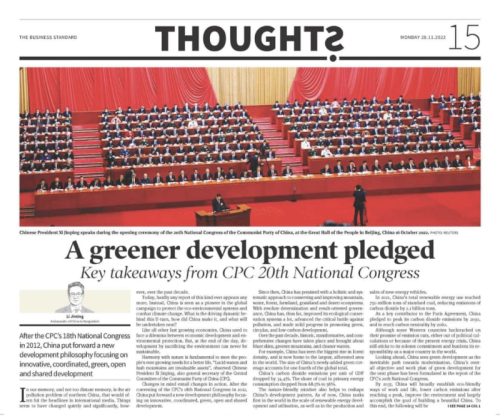On November 28, 2022, The Business Standard published an article titled A Greener Development Pledged authored by H.E. Li Jiming, Ambassador of China to Bangladesh. It is the third episode of the series titled Key Takeaways from CPC 20th National Congress.

The full text of the article is as follows:
In our memory, and not too distant memory, is the air pollution problem of northern China, that would often hit the headlines in international media. Things seem to have changed quietly and significantly, however, over the past decade.
Today, hardly any report of this kind ever appears any more. Instead, China is seen as a pioneer in the global campaign to protect the eco-environmental systems and combat climate change. What is the driving dynamic behind this U-turn, how did China make it, and what will be undertaken next?
Like all other fast growing economies, China used to face a dilemma between economic development and environmental protection. But, at the end of the day, development by sacrificing the environment can never be sustainable.
Harmony with nature is fundamental to meet the people's ever-growing needs for a better life. "Lucid waters and lush mountains are invaluable assets", observed Chinese President Xi Jinping, also general secretary of the Central Committee of the Communist Party of China (CPC).
Changes in mind entail changes in action. After the convening of the CPC's 18th National Congress in 2012, China put forward a new development philosophy focusing on innovative, coordinated, green, open and shared development.
Since then, China has persisted with a holistic and systematic approach to conserving and improving mountain, water, forest, farmland, grassland and desert ecosystems. With resolute determination and result-oriented governance, China has, thus far, improved its ecological conservation systems a lot, advanced the critical battle against pollution, and made solid progress in promoting green, circular, and low-carbon development.
Over the past decade, historic, transformative, and comprehensive changes have taken place and brought about bluer skies, greener mountains, and cleaner waters.
For example, China has seen the biggest rise in forest density, and is now home to the largest, afforested area in the world. The size of China's newly-added green coverage accounts for one fourth of the global total.
China's carbon dioxide emissions per unit of GDP dropped by 34.4%. The share of coal in primary energy consumption dropped from 68.5% to 56%.
The nature-friendly mindset also helps to reshape China's development pattern. As of now, China ranks first in the world in the scale of renewable energy development and utilisation, as well as in the production and sales of new-energy vehicles.
In 2021, China's total renewable energy use reached 750 million tons of standard coal, reducing emissions of carbon dioxide by 2.1 billion tons.
As a key contributor to the Paris Agreement, China pledged to peak its carbon dioxide emissions by 2030, and to reach carbon neutrality by 2060.
Although some Western countries backtracked on their promise of emission cuts, either out of political calculations or because of the present energy crisis, China still sticks to its solemn commitment and burdens its responsibility as a major country in the world.
Looking ahead, China sees green development as the inevitable path towards modernisation. China's overall objective and work plan of green development for the next phase has been formulated in the report of the CPC's 20th National Congress.
By 2035, China will broadly establish eco-friendly ways of work and life, lower carbon emissions after reaching a peak, improve the environment and largely accomplish the goal of building a beautiful China. To this end, the following will be rigorously implemented.
First, China will improve the industrial structure and the energy mix. We will implement a conservation strategy and upgrade the policies and systems of standards to boost green and low-carbon industries.
Green consumption will be encouraged to advance green and low-carbon ways of production and life through accelerating the R&D and application of energy-saving and carbon emission reduction technologies.
Second, China will continue to control pollution in a lawful, targeted, and science-based way. The environmental infrastructure will be upgraded and living environments in both urban and rural areas will be improved.
More jobs will be taken up to modernise the environmental governance system. We will rigorously prevent and control environmental risks and strengthen inspections.
Third, China will carry out major projects for preserving and restoring key ecosystems to enhance diversity, stability, and sustainability in our ecosystems.
Major biodiversity protection projects and large-scale greening programs will be undertaken. We will also establish mechanisms to realise the market value of ecosystem goods and services, and improve the compensation system for ecological conservation.
Fourth, China will work actively and prudently toward the carbon goals. We will better control the amount and intensity of energy consumption, particularly of fossil fuels.
Clean, low-carbon, and high-efficiency energy use will be boosted. We will thoroughly advance the energy revolution and speed up the planning and development of a system for new energy sources. The carbon absorption capacity of ecosystems will also be enhanced.
As a member of the global village and a vigorous player in the world economy, Bangladesh also faces critical challenges of environmental degradation and climate change.
Fortunately, the country has become well aware of the gravity of these issues, and has taken plausible actions. The Mujib Climate Prosperity Plan (MCPP), adopted in 2020, will play a key role in guiding the country's development paradigm to the track of green transition by 2030.
In recognition of Bangladesh's far-reaching initiatives to address climate change, the United Nations has named the Honourable Prime Minister Sheikh Hasina "Champion of the Earth", UN's highest environmental accolade.
During my visit to Rajshahi very recently, I was also impressed by local people's ambition to build a green, clean and healthy community.
As Bangladesh and China converge on environmental goals, there is significant potential for the two countries to synergise on green development strategies, thereby building a shared human community, in harmony with nature.
